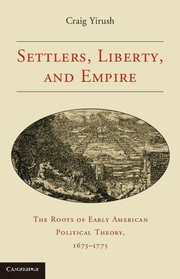Book contents
- Frontmatter
- Contents
- Acknowledgments
- Introduction
- PART I RESTORATION AND REBELLION
- PART II EMPIRE
- 3 Jeremiah Dummer and the Defense of Chartered Government
- 4 John Bulkley and the Mohegans
- 5 Daniel Dulany and the Natural Right to English Law
- 6 Richard Bland and the Prerogative in Pre-Revolutionary Virginia
- PART III REVOLUTION
- Conclusion
- Index
- References
3 - Jeremiah Dummer and the Defense of Chartered Government
Published online by Cambridge University Press: 05 June 2012
- Frontmatter
- Contents
- Acknowledgments
- Introduction
- PART I RESTORATION AND REBELLION
- PART II EMPIRE
- 3 Jeremiah Dummer and the Defense of Chartered Government
- 4 John Bulkley and the Mohegans
- 5 Daniel Dulany and the Natural Right to English Law
- 6 Richard Bland and the Prerogative in Pre-Revolutionary Virginia
- PART III REVOLUTION
- Conclusion
- Index
- References
Summary
The collapse of the Dominion of New England left the American colonies in the same fragmented state they had been in prior to the accession of James II. However, the old Stuart dream of a centralized empire persisted among imperial administrators in London in the decades immediately following the Glorious Revolution. In 1696, nearing the end of the first of two long wars with the French, William III replaced the old and by now ineffectual Lords of Trade with a new body, the Board of Trade. Along with the Privy Council, the secretary of state, the Admiralty, and other agencies with responsibility for colonial governance, the Board of Trade then embarked on a series of measures to extend royal authority more effectively across the Atlantic, culminating in a wholesale assault on the charters of the private colonies. The result of these policies was an eighteenth-century empire more integrated than the Stuarts' scattered and highly autonomous plantations, but one whose inhabitants were subject to royal authority in a way that, following the revolution settlement, was no longer the constitutional norm within the realm. The ongoing assertion of prerogative outside the realm ensured that the Restoration-era debate about colonial rights continued into the eighteenth century, as settlers periodically clashed with imperial officials over the distribution of political power and legal rights in the empire. Furthermore, as a consequence of the Board's centralizing policies, a newly empowered Parliament began to exert its sovereignty across the Atlantic with ultimately revolutionary consequences.
- Type
- Chapter
- Information
- Settlers, Liberty, and EmpireThe Roots of Early American Political Theory, 1675–1775, pp. 83 - 112Publisher: Cambridge University PressPrint publication year: 2011



